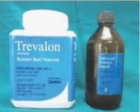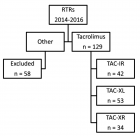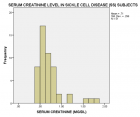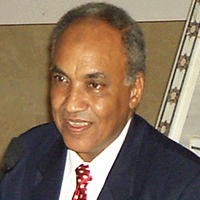Abstract
Research Article
Pathological Findings on Dental Panoramic Tomograms of Edentulous Patients Seen at a University Hospital
Cyril Nyalik Ogada*, Ouma DO and Mutave RJ
Published: 19 April, 2018 | Volume 3 - Issue 1 | Pages: 025-028
Objective: To describe pathological fi ndings on pre-treatment dental panoramic tomograms of edentulous jaws taken before complete denture treatment.
Design: Descriptive cross-sectional study.
Setting: Prosthetic division, Department of Conservative and Prosthetic Dentistry.
School of Dental Sciences, University of Nairobi.
Results: Data was obtained from clinical records and OPGs of 163 edentulous patients seen at the prosthetic clinic between 2010 and 2016 for complete denture therapy. From history and examination alone, clinicians reported significant findings on 50.3% of records, while 43.6% had no such findings. Ten (10) (6.1%) records were unclear. Examination of OPGs revealed 79.1% of the films had no pathological findings while in 20.9% had. Most of the findings (70.0%) were retained roots, 6% were radio-lucencies, 12% were other radio-opacities, 9% were impacted teeth while 3% had both retained root and radio-opacity. Most pathologies (64%) were located in the posterior region of jaws while the other findings were evenly distributed in the anterior and posterior regions of the jaws. There was no predilection of pathological findings to any other factor other than gender. In 83.4% records, queries on clinical notes coincided with significant findings on OPGs; while 16.6% were either unclear or did not coincide. Most (71%) OPG findings led to modification of treatment plan.
Conclusion: Pathological findings are common on pre-treatment OPGs. It may be good practice to take an OPG for edentulous patients prior to complete denture therapy where such services are available, to prevent complications from intra-bony pathologies. However, Most of the findings are either detectable by clinical exam or may not be of major consequence to the health of patients. Complete denture may be done without OPGs for new and old denture wearers where the service is not available.
Read Full Article HTML DOI: 10.29328/journal.johcs.1001024 Cite this Article Read Full Article PDF
References
- Kogon S, Bohay R, Stephens R. A survey of the radiographic practices of general dentists for edentulous patients. Oral Surg Oral Med Oral Pathol Oral Radiol Endod. 1995; 80: 365-368. Ref.: https://goo.gl/WPyt3m
- Edgerton M, Clark P. Location of abnormalities in panoramic radiographs of edentulous patients. Oral Surg Oral Med Oral Pathol 1991; 71: 106-109. Ref.: https://goo.gl/NTJ5P9
- Rushton VE, Homer K. The use of panoramic radiology in dental practice. J Dent. 1996; 24: 185-201. Ref.: https://goo.gl/g6ETq6
- Jindal S, Sheikh S, Kulkarni S, Singla A. Significance of pre-treatment panoramic radiographic assessment of edentulous patients-A Survey. Med Oral Patol Oral Cir Bucal. 2011; 16: 600-606. Ref.: https://goo.gl/iqdxxa
- Spyropoulos ND, Patsakas AJ, Angelopoulos AP. Findings from radiographs of the jaws of edentulous patients. Oral Surg Oral Med Oral Pathol. 1981; 52: 455-459. Ref.: https://goo.gl/oFQ8ee
- Jones JD, Seals RR, Schelb E. Panoramic radiographic examination of edentulous patients. J Prosthet Dent. 1985; 53: 535-539. Ref.: https://goo.gl/42gmDF
- Kose TE, Demirtas N, Karabas HC, Ozcan I. Evaluation of dental panoramic radiographic findings in edentulous jaws: A retrospective study of 743 patients "Radiographic features in edentulous jaws". J Adv Prosthodontics. 2015; 7: 380-385. Ref.: https://goo.gl/7ZXbkJ
Similar Articles
-
Infection Control Mechanisms Employed by Dental Laboratories to Prevent Infection of their Dental Technicians/TechnologistsKilimo C Sammy*,Simiyu N Benjamin. Infection Control Mechanisms Employed by Dental Laboratories to Prevent Infection of their Dental Technicians/Technologists. . 2016 doi: 10.29328/journal.johcs.1001001; 1: 001-011
-
Evaluation of ImageJ for Relative Bone Density Measurement and Clinical ApplicationManuel Geiger*,Galina Blem,Arwed Ludwig. Evaluation of ImageJ for Relative Bone Density Measurement and Clinical Application . . 2016 doi: 10.29328/journal.johcs.1001002; 1: 012-021
-
Promising Future in the Detection of Oral Cancer by Using Advance Screening TechnologyMohamed Yasser Kharma*,Mohamed Sadek Alalwani,Manal Fouad Amer. Promising Future in the Detection of Oral Cancer by Using Advance Screening Technology . . 2016 doi: 10.29328/journal.johcs.1001003; 1: 022-33
-
Evaluation of Horizontal Lip Position in Adults with Different Skeletal Patterns: A Cephalometric StudyRohit Kulshrestha*,Vinay V Umale,Kamlesh Singh,Aftab Azam,Madhvi Bhardwaj. Evaluation of Horizontal Lip Position in Adults with Different Skeletal Patterns: A Cephalometric Study . . 2017 doi: 10.29328/journal.johcs.1001005; 2: 009-016
-
Normal Value of Skull Base Angle Using the Modified Magnetic Resonance Imaging Technique in Thai PopulationSiriporn Hirunpat*,Nat Wimolsiri,Nuttha Sanghan. Normal Value of Skull Base Angle Using the Modified Magnetic Resonance Imaging Technique in Thai Population . . 2017 doi: 10.29328/journal.johcs.1001006; 2: 017-021
-
Comparative Study of Enophthalmos Treatment with Titanium Mesh Combined with Absorbable Implant vs. Costochondral Graft for Large Orbital Defects in Floor FracturesMalagón Hidalgo*,Héctor Omar,González Magaña,Fernando, Kalach Mussali,Alberto Jaime,Mejía Valero,Sergio Abraham,Vilchis López,Roberto,Araiza Gómez,Edgardo,Kalach Mussali. Comparative Study of Enophthalmos Treatment with Titanium Mesh Combined with Absorbable Implant vs. Costochondral Graft for Large Orbital Defects in Floor Fractures . . 2017 doi: 10.29328/journal.johcs.1001007; 2: 022-29
-
Visualization and Evaluation of Changes after Rapid Maxillary ExpansionIlija Christo Ivanov*,Dagmar Strakova,Tatjana Dostalova,Jan Dupej,Sarka Bejdova,Veronika Ciganova. Visualization and Evaluation of Changes after Rapid Maxillary Expansion . . 2017 doi: 10.29328/journal.johcs.1001008; 2: 030-37
-
Orthodontics Miniscrews to Correct an Anchorage Loss: Case ReportHoub-Dine A*,Zaoui F. Orthodontics Miniscrews to Correct an Anchorage Loss: Case Report. . 2017 doi: 10.29328/journal.johcs.1001009; 2: 038-042
-
External Root Resorption associated with Impacted Third Molars: A Case ReportRenato Marano*,Gabriela Mayrink,Paula Ramos Ballista,Laisa Kinderlly,Stella Araujo. External Root Resorption associated with Impacted Third Molars: A Case Report . . 2017 doi: 10.29328/journal.johcs.1001010; 2: 043-048
-
Clown language training in Dental education: Dental Student’s PerspectiveSiddharth Tevatia*,Richa Dua,Vinita Dahiya,Nikhil Sharma,Rahul Chopra,Vidya Dodwad. Clown language training in Dental education: Dental Student’s Perspective . . 2017 doi: 10.29328/journal.johcs.1001011; 2: 049-056
Recently Viewed
-
Physiotherapy Undergraduate Students’ Perception About Clinical Education; A Qualitative StudyPravakar Timalsina*,Bimika Khadgi. Physiotherapy Undergraduate Students’ Perception About Clinical Education; A Qualitative Study. J Nov Physiother Rehabil. 2024: doi: 10.29328/journal.jnpr.1001063; 8: 043-052
-
Clinical Significance of Anterograde Angiography for Preoperative Evaluation in Patients with Varicose VeinsYi Liu,Dong Liu#,Junchen Li#,Tianqing Yao,Yincheng Ran,Ke Tian,Haonan Zhou,Lei Zhou,Zhumin Cao*,Kai Deng*. Clinical Significance of Anterograde Angiography for Preoperative Evaluation in Patients with Varicose Veins. J Radiol Oncol. 2025: doi: 10.29328/journal.jro.1001073; 9: 001-006
-
Regional Anesthesia Challenges in a Pregnant Patient with VACTERL Association: A Case ReportUzma Khanam*,Abid,Bhagyashri V Kumbar. Regional Anesthesia Challenges in a Pregnant Patient with VACTERL Association: A Case Report. Int J Clin Anesth Res. 2025: doi: 10.29328/journal.ijcar.1001027; 9: 010-012
-
Cystoid Macular Oedema Secondary to Bimatoprost in a Patient with Primary Open Angle GlaucomaKonstantinos Kyratzoglou*,Katie Morton. Cystoid Macular Oedema Secondary to Bimatoprost in a Patient with Primary Open Angle Glaucoma. Int J Clin Exp Ophthalmol. 2025: doi: 10.29328/journal.ijceo.1001059; 9: 001-003
-
Navigating Neurodegenerative Disorders: A Comprehensive Review of Current and Emerging Therapies for Neurodegenerative DisordersShashikant Kharat*, Sanjana Mali*, Gayatri Korade, Rakhi Gaykar. Navigating Neurodegenerative Disorders: A Comprehensive Review of Current and Emerging Therapies for Neurodegenerative Disorders. J Neurosci Neurol Disord. 2024: doi: 10.29328/journal.jnnd.1001095; 8: 033-046
Most Viewed
-
Evaluation of Biostimulants Based on Recovered Protein Hydrolysates from Animal By-products as Plant Growth EnhancersH Pérez-Aguilar*, M Lacruz-Asaro, F Arán-Ais. Evaluation of Biostimulants Based on Recovered Protein Hydrolysates from Animal By-products as Plant Growth Enhancers. J Plant Sci Phytopathol. 2023 doi: 10.29328/journal.jpsp.1001104; 7: 042-047
-
Sinonasal Myxoma Extending into the Orbit in a 4-Year Old: A Case PresentationJulian A Purrinos*, Ramzi Younis. Sinonasal Myxoma Extending into the Orbit in a 4-Year Old: A Case Presentation. Arch Case Rep. 2024 doi: 10.29328/journal.acr.1001099; 8: 075-077
-
Feasibility study of magnetic sensing for detecting single-neuron action potentialsDenis Tonini,Kai Wu,Renata Saha,Jian-Ping Wang*. Feasibility study of magnetic sensing for detecting single-neuron action potentials. Ann Biomed Sci Eng. 2022 doi: 10.29328/journal.abse.1001018; 6: 019-029
-
Pediatric Dysgerminoma: Unveiling a Rare Ovarian TumorFaten Limaiem*, Khalil Saffar, Ahmed Halouani. Pediatric Dysgerminoma: Unveiling a Rare Ovarian Tumor. Arch Case Rep. 2024 doi: 10.29328/journal.acr.1001087; 8: 010-013
-
Physical activity can change the physiological and psychological circumstances during COVID-19 pandemic: A narrative reviewKhashayar Maroufi*. Physical activity can change the physiological and psychological circumstances during COVID-19 pandemic: A narrative review. J Sports Med Ther. 2021 doi: 10.29328/journal.jsmt.1001051; 6: 001-007

HSPI: We're glad you're here. Please click "create a new Query" if you are a new visitor to our website and need further information from us.
If you are already a member of our network and need to keep track of any developments regarding a question you have already submitted, click "take me to my Query."
















































































































































